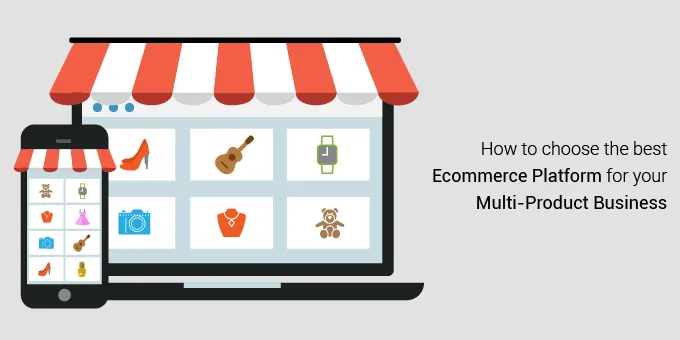

Tips to Choose the Right Ecommerce Platform for your Multi-Product Business
Ecommerce platforms have changed the complete business economy and developed a new form of communication between customers and businesses. While it is easy to build an online store, managing your online business is another ball game altogether. Running an online store is way too difficult than managing a physical store, as you have to worry not only about the sourcing of goods but also presentation, sales, shipping, delivery, returns and a lot more.
If you have a multi-product business, the challenges are even greater.

Well, we are not discouraging you. But the reality is that you should always choose the right platform and resources for your business that can handle the challenges of online selling.
Role of Ecommerce platforms
With no doubts, it is the backbone of any enterprise as it allows the front-end and back-end of your business to work in tandem. It not only supports your business operations but also acts as a growth enabler, helps in the expansion of online business offerings, provides seamless customer experience and much more.
E Commerce is a fluid world and you need to be well-prepared to survive in this industry. Having the right ecommerce platform is vital for your customers as well as employees. Simply, it handles everything, from front-end to back-end of your business. This includes customizable web design, customer relationship management, warehouse and inventory management, mobile commerce, and many other aspects that empower your online business.
Before these platforms dawned, the companies used to hire costly IT and server, development teams. They were not scalable, time-consuming, difficult to integrate with other software within the business. All the data of your business – pricing, products, customer profiles, marketing and promotions, inventory can be used to give you an overview of your business and ways to make it better.
The best recipe for the success of your online business is the mixture of right application, relevant data, and appropriate user interface.
Make a Difference with SaaS ecommerce platform
Most of the businesses are scaling their online businesses but they typically adopt a “one-size-fits-all” approach. This approach is suitable for store owners but not for potential customers.
Catering to the different needs of different audiences is the need of the hour.
If you sell multiple products, investing in a multi-store platform is the decision you will never regret. Let’s understand the challenges of a multi-store platform.
1. Data management
As the name indicates, multi-store will have multiples of almost everything, be it inventories, customer databases, order management system etc. Keeping the data systematic for multiple stores is a big task and poses a significant challenge. A multi-store platform helps you cater to the diverse business requirements.
2. Integration of multiple systems
Managing an online store requires multiple integrations, starting from customers, payments, inventory, and much more. When you operate a multi-store business, the challenges of dynamic integrations increase drastically. Moreover, it does not only require integration capabilities but all these systems should work together smoothly.
3. Less resources
The solution to all the problems of online business can also create a whole new problem of “increased resources cost”. The efforts required to keep the online store up to date can consume a lot of money, time, and man-hours.
4.Consistency in brand messaging
When you are running more than one online store, different brand messages need to be conveyed to the target audience. It is important to ensure that the brand messages are consistent for individual store across the multiple platforms like laptops, smartphones, tablets etc. A specialized ecommerce platform can help you streamline your marketing and promotions and also, grow your traffic and conversions.
Tips to choose the right platform for your multi-product business
The right platform will have all the must-have features to provide seamless customer experience and make your business grow more.
In addition to these must-have features, consider these tips to choose the most appropriate ecommerce platform solution for your multi-store business.
1. Headless content management system
There are endless reasons for a business to consider a headless system. Among them, one of the most important reasons is improved customization, utilization for multiple stores, relief from tedious tasks of conventional platforms, reduced man-hours and cost.
How a business is being managed has a major impact on the website, conversions, brand image, and overall business performance. So, it is very important to look beyond the conventional content management system.
A headless ecommerce works seamlessly by passing the requests between the application and presentation layers with the help of web services. For example, when a user clicks “Buy Now”, the presentation sends the request to the application layer to show the order page. It helps your brand to get the orders placed, deliver the products, manage resources and help you propel the content everywhere.
The natively managed headless ecommerce platform helps you re-architect your business with their future-proof features in a whole new manner.
2.Niche for every store
The innovative software allows you to manage multiple websites from an integrated admin panel while managing your niche in every store. Each published site can have a single database to target niche products and markets, carve out specialized offerings.
Make the most with a SaaS ecommerce platform:
- Per store user – Publish unique content on every store and every website displays different product content and pricing.
- Per store currency and templates – Apply different templates for each website and manage according to the different buying behaviour of customers on every site. With the global features, the currency and languages can be customized for the multi-store business.
- Integrated database – With multi-store features, you can create niche stores for your best-performing products while managing the single product database.
- Specialized customers and marketing for each site – Your multiple stores can have unique content, product content and pricing for custom pages. And the marketing can also be focused according to the different customer profiles.
3. Master database for inventory, customers, orders etc.
A multi-channel platform allows you to manage a single database of customers, orders, inventory and other data. Its functionality is not limited to the storage of data but it also synchronizes the products, adjusts inventory levels, design customized promotions, analyse the data, and much more.
Some of the most common features a multi-store ecommerce platform includes:
- Product feeds – Download your products from the platform and upload them to different sales channels
- Manage orders – Entrust the order management task in the hands of innovative software.
- Set up marketing campaigns – Promote your products with the customized marketing landing pages, flexible pricing etc.
- Get data insights – Learn more about your platform usage, customers, marketing results to bring the highest sales and revenue.
Choose the right platform for your better tomorrow
Following these tips will help you evaluate the major aspects of a platform while avoiding mistakes. As we move into an IoT dominant and consumer-driven era, it is important to select an ecommerce platform that is built for your improved today and better tomorrow.
A future-oriented and headless ecommerce platform helps you adapt to the dynamicity of ecommerce industry, and helps you grow your multi-store business.






